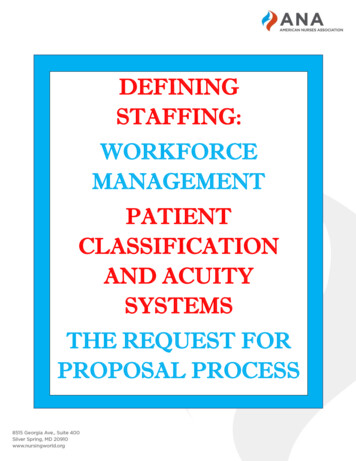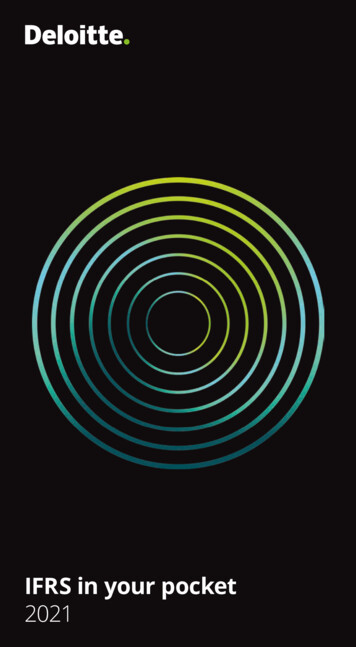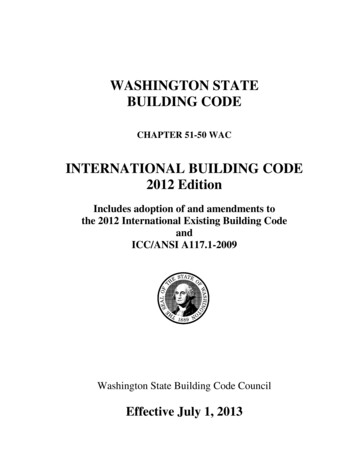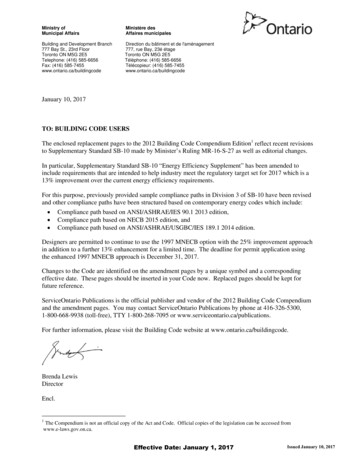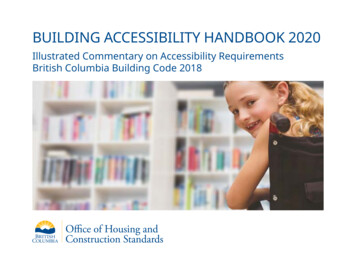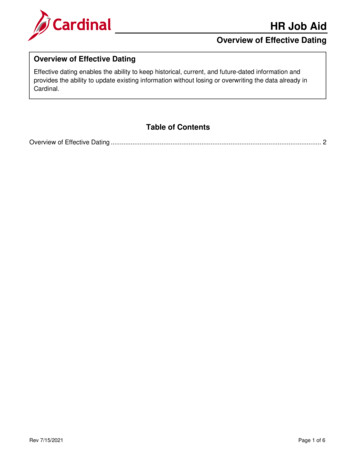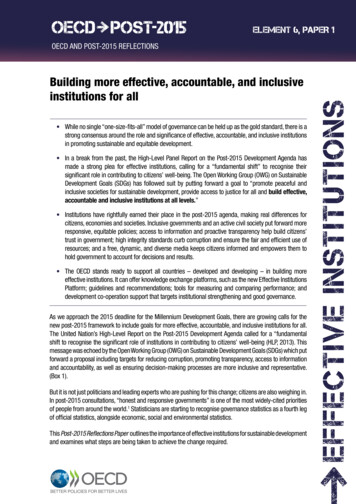
Transcription
Element 6, PAPER 1Building more effective, accountable, and inclusiveinstitutions for all While no single “one-size-fits-all” model of governance can be held up as the gold standard, there is astrong consensus around the role and significance of effective, accountable, and inclusive institutionsin promoting sustainable and equitable development. In a break from the past, the High-Level Panel Report on the Post-2015 Development Agenda hasmade a strong plea for effective institutions, calling for a “fundamental shift” to recognise theirsignificant role in contributing to citizens’ well-being. The Open Working Group (OWG) on SustainableDevelopment Goals (SDGs) has followed suit by putting forward a goal to “promote peaceful andinclusive societies for sustainable development, provide access to justice for all and build effective,accountable and inclusive institutions at all levels.” Institutions have rightfully earned their place in the post-2015 agenda, making real differences forcitizens, economies and societies. Inclusive governments and an active civil society put forward moreresponsive, equitable policies; access to information and proactive transparency help build citizens’trust in government; high integrity standards curb corruption and ensure the fair and efficient use ofresources; and a free, dynamic, and diverse media keeps citizens informed and empowers them tohold government to account for decisions and results. The OECD stands ready to support all countries – developed and developing – in building moreeffective institutions. It can offer knowledge exchange platforms, such as the new Effective InstitutionsPlatform; guidelines and recommendations; tools for measuring and comparing performance; anddevelopment co-operation support that targets institutional strengthening and good governance.As we approach the 2015 deadline for the Millennium Development Goals, there are growing calls for thenew post-2015 framework to include goals for more effective, accountable, and inclusive institutions for all.The United Nation’s High-Level Report on the Post-2015 Development Agenda called for a “fundamentalshift to recognise the significant role of institutions in contributing to citizens’ well-being (HLP, 2013). Thismessage was echoed by the Open Working Group (OWG) on Sustainable Development Goals (SDGs) which putforward a proposal including targets for reducing corruption, promoting transparency, access to informationand accountability, as well as ensuring decision-making processes are more inclusive and representative.(Box 1).But it is not just politicians and leading experts who are pushing for this change; citizens are also weighing in.In post-2015 consultations, “honest and responsive governments” is one of the most widely-cited prioritiesof people from around the world.1 Statisticians are starting to recognise governance statistics as a fourth legof official statistics, alongside economic, social and environmental statistics.This Post-2015 Reflections Paper outlines the importance of effective institutions for sustainable developmentand examines what steps are being taken to achieve the change required.EFFECTIVE INSTITUTIONSOECD AND post-2015 reflections
Why focus on institutions in the post 2015 development agenda?Weak institutions can undermine countries’ prospects for growth. Indeed, the mechanisms linkingeffective institutions (defined in Box 1), economic growth and people’s well-being are numerous: Inclusive political processes which actively engage citizens and other stakeholders build trustin government and help create more responsive and equitable policies and public services thatare better suited to diverse needs (OECD, 2014a). Government organisations which uphold principles of integrity and disclosure, and are subjectto objective and thorough oversight processes, are more accountable to the public andless susceptible to corruption and the mismanagement of funds which can divert preciousresources away from governments’ goals. The implications of weak integrity and anti-corruptionmechanisms are serious, with corruption costing an estimated 5% of global GDP or USD 2.6trillion every year (ICC et al., 2009). Capable and adequately-resourced public organisations are key to the delivery of publicservices and form an essential part of the enabling environment for attracting investment andsupporting private sector development. Strong tax administrations and sound public financial management help maximise the domesticresources that are necessary for government to function, to sustain social safety nets, tomaintain long-term fiscal sustainability, and to free up fiscal space for pursuing socio-economicobjectives. The United Nations considers that 20% of GDP mobilised as tax is the minimumlevel necessary to achieve the Millennium Development Goals. Yet in 2012 low-income Africancountries mobilised only around 16.8% of their GDP in tax revenues on average (OECD/AfDB/UNDP, 2014). A dynamic, pluralistic and free media helps keep citizens informed and empowers them toscrutinise and hold government to account for decisions and results.Box 1. What are effective institutions?The term “institution” is used by the Secretary-General’s High-Level Panel (HLP) of eminent persons on the Post2015 Development Agenda to cover rules, laws and government entities, as well as the informal rules of socialinteractions. Effective institutions enable people to work together effectively and peacefully. Fair institutions ensurethat all people have equal rights and a chance to improve their lives, and access to justice when they are wronged.Institutions can be both formal and informal. Core formal institutions include laws, contracts and formal publicmanagement processes (such as public financial management, procurement, and human resources management),while informal institutions refer to broader norms and values that can influence behaviour. In essence, however,institutions (whether formal or informal) define how power is managed and used, how states and societies arrive atdecisions, and how they implement those decisions and measure and account for the results.Effective institutions can take many forms: robust legal frameworks and representative parliaments with strongcapacity for oversight; adept civil services and the timely and quality delivery of public services; efficient judiciariesthat uphold the rule of law; vibrant and actively engaged civil societies; and free and independent media. Theseinstitutions depend on the development of decentralised, democratic decision-making processes.2Building more effective, accountable, and inclusive institutions for all
(Box 1. Continued)The OWG on SDGs has put forward a number of possible targets to “build effective, accountable and inclusiveinstitutions at all levels” including: substantially reducing corruption and bribery in all its forms developing effective, accountable and transparent institutions at all levels ensuring responsive, inclusive, participatory and representative decision-making at all levels ensuring public access to information and protecting fundamental freedoms, in accordance with nationallegislation and international agreementsSources: OWG Outcome Document (July 19, 2014); North, 1990; Rodrik, 2011; Rodrik et al., 2004; Acemoglu and Robinson,2012.Issues to address in the post-2015 frameworkIn this section we outline a number of priority actions that could address the goals and issue areasraised by the Open Working Group (see Box 1) for achieving effective, accountable, and inclusiveinstitutions for all, namely: (1) promoting inclusiveness and citizen engagement, including in thedelivery of public services; (2) ensuring rights to access to information and increasing proactivetransparency; and (3) mainstreaming integrity principles to prevent and curb corruption.Inclusive, representative and responsive institutionsInclusive institutions level the playing field and provide all citizens with opportunities to participatein and shape public policy (Acemoglu and Robinson, 2012). However, in practice, politics and policymaking can empower some, while marginalising others. For example, lobbying allows privilegedaccess to decision-making processes for those with greater organisational and financial resources(OECD, 2013b). When state institutions are unduly influenced by private interests using nontransparent means, the result is known as “state capture” – a form of political corruption. Inequitabledistribution of resources and property is more likely to occur when state capture is allowed, politicalpower is allocated disproportionately, and accountability and transparency are limited.The Arab Spring highlighted the importance of inclusive public institutions and a more equitableallocation of political power. But citizens’ dissatisfaction with the way government works also extendsto well-established market economies, as witnessed by the significant erosion of trust in publicinstitutions across OECD countries since the onset of the financial crisis.One of the most effective means of supporting citizen engagement is to provide formal channels forpeople to express their views on draft laws and policies. Government institutions should activelyconsult non-governmental stakeholders (the private sector, civil society and citizens) in the formulationof laws and policies in order to ensure these best serve the public interest and are informed by thelegitimate needs of those affected by them. Governments should also include such stakeholders whenmonitoring and evaluating programmes and policies, as they can provide feedback on the impact ofthese policies and programmes on intended users and recipients. Every reasonable effort should be3
made to engage with as wide a variety of stakeholders as possible. To accomplish this, governmentsare increasingly exploiting the power of new information and communication technologies (ICT) toincrease awareness and participation. The OECD’s Recommendation of the Council on RegulatoryPolicy and Governance (OECD, 2013a) includes some best practice guidance on how to engage withstakeholders during the legislative process (Box 2).Box 2: Best practice in regulatory policy and governanceThe OECD’s Recommendation of the Council on Regulatory Policy and Governance puts forward some specificrecommendations to promote inclusiveness. Most notable is that governments should provide meaningfulopportunities (including online) for the public to contribute to the process of preparing draft regulatory proposalsand to the quality of the supporting analysis. Specifically, they propose that governments consider:1. Establishing a clear policy identifying how open and balanced public consultation on the development ofrules will take place2. Co-operating with stakeholders on reviewing existing and developing new regulations by:a. Actively engaging all relevant stakeholders during the regulation-making process and designingconsultation processes to maximise the quality of the information received and its effectivenessb. Consulting on all aspects of impact assessment analysis and using, for example, impact assessmentsas part of the consultation processc. Making available to the public, as far as possible, all relevant material from regulatory dossiersincluding the supporting analyses, and the reasons for regulatory decisions as well as all relevantdatad. Structuring reviews of regulations around the needs of those affected by the regulation, and cooperating with them through the design and conduct of reviews including prioritisation, assessmentof regulations and drafting simplification proposalse. Evaluating the competitive effects of regulation on various economic players in the market.3. Introducing regular performance assessments of regulations and regulatory systems, taking into accountthe impacts on affected parties and how they are perceived, among other things. The results of theseassessments should be communicated to the public.4. Making sure that policies and practices for inspections and enforcement respect the legitimate rights ofthose subject to the enforcement, are designed to maximise the net public benefits through compliance andenforcement and avoid unnecessary burdens on those subject to inspections.5. Ensuring all regulations are easily accessible by the public. A complete and up-to-date legislative andregulatory database should be freely available to the public in a searchable format through a user-friendlyinterface on the Internet.6. Requiring regulatory texts to be drafted using plain language. They should also provide clear guidance oncompliance with regulations, making sure that affected parties understand their rights and obligations.Source: based on OECD (2013a).4Building more effective, accountable, and inclusive institutions for all
Engaging individual citizens and civil society organisations as partners in the design, production anddelivery of public services is also important: it increases citizen satisfaction and, potentially, reducescosts. Public services such as education, health care and job search assistance work better whendesigned and delivered in partnership with citizens in a way that harnesses their interest, energies,expertise and ambitions. They may also be more effective since they are more responsive andtailored to the needs of different groups of citizens (e.g. older persons, citizens living in rural areas,etc.) (OECD, 2009b). Collaborative rather than competitive arrangements are key foundations for aninclusive approach to public service delivery, and provide an alternative to the traditional commandand control mechanisms that are based on a hierarchical relationship between government and thedelivery body, whether public or private.Transparency and access to informationAccess to public sector information allows citizens to be more involved in the policy-making cycle,promotes accountability for results and builds citizens’ trust in government institutions. Freedom ofinformation (FoI) laws – also referred to as access to information laws – are a fundamental pillarof transparency. They enshrine in legislation citizens’ “right to know”, thus enhancing governmentaccountability and promoting informed participation in policy making. Having the legislation in placeis not enough, however; there must also be procedures for facilitating information requests andfor ensuring their timely response (OECD, 2013b). Proactive disclosure (e.g. release of informationwithout requiring a formal information request) is also essential for building trust. In particular, fiscaltransparency, information on procurement spending, as well as disclosure of private interests areimportant, with the Open Government Partnership citing such information in their eligibility criteria.2Budget transparency also contributes to trust in government. Publicly available, comprehensivebudget documentation can make it easier for the public to understand fiscal policies and governmentpriorities. Budget disclosures can contribute to fiscal discipline, the effective allocation of resourcesand operational efficiency. They can also enable governments to be held accountable for producingrealistic and sustainable budgets, and for the social and economic impact of planned policy measures.The International Budget Partnership scores and ranks countries by the degree to which theirbudgetary documents are comprehensive, transparent, and released in a timely manner (Figure 1).Although the disclosure of government fiscal and budgetary information is essential and becomingmore common, the information can often be complex, inadvertently reducing transparency andaccountability. Indeed, non-expert audiences can easily be intimidated by technical language andby the volume of budget information presented to legislatures, or confused by the role and extent ofextra-budgetary activities. Some countries therefore publish citizens’ budgets: easy-to-understandsummary documents of the main features of the annual budget as presented to the legislature,including explanations and definitions of technical terms.5
Figure 1. Open Budget Survey Index scores, 2012Top 20 ranking eIndiaak RepublicSlovan ylGermBrazitateshRepublicSouth ranomdenSweingddKth s: *The graph shows the top 20 ranking countries, including cases of tied scores. Indonesia and Portugal tied for 20th place.Source: International Budget Partnership, Open Budget Survey: get-survey/,accessed 30 June 2014.Given the high financial interests at stake in public procurement, the large volume of transactions,and the close interaction between the public and the private sectors, the procurement sectorpresents multiple opportunities for private gain and waste of taxpayers’ money. Providing adequatetransparency throughout the entire public procurement cycle is critical for minimising the risk of fraud,corruption and mismanagement of public funds, and for levelling the playing field for businesses andthereby promoting competition. The accessibility of information, the participation of stakeholders inall key stages of the procurement cycle, and the possibility of review and remedy in case of disputeare all essential for transparency and accountability in public procurement. The OECD has producedPrinciples for Integrity in Public Procurement, which include stipulations concerning transparency inprocurement data (OECD, 2009a).Increasingly, governments are publishing vast amounts of public information. Open government data– the publication and free use and re-use of data produced or commissioned by government – canhelp increase transparency as well as generate insights into how to improve government performanceand hold governments accountable. Open government data provide the basis for meaningful publicparticipation and collaboration in creating services and policies, and are ultimately expected toimprove decision making by governments and individuals alike.6Building more effective, accountable, and inclusive institutions for all
While the release of information is a first key step, doing it in such a way that ensures greateraccountability for results is more complex. Accountability institutions (e.g. supreme audit institutions,the media, parliamentary committees and bodies, etc.) play an important role and are natural alliesin ensuring government works in favour of the public interest and spends taxpayers’ resources moreefficiently.Mainstreaming integrity and fighting corruptionIntegrity is a key attribute of well-functioning public institutions: there is a strong correlation betweenpeople’s perception of government corruption and their trust in political institutions. Strengtheningthe integrity, openness and credibility of both government institutions and the policy-making processshould therefore be a priority for governments around the world. This requires institutionalisedmechanisms for disclosure, monitoring and enforcement, as well as for complaint resolution.Ensuring that the integrity of government decisions is not compromised by conflicts of interest, forexample, is critical to maintaining public trust in government. Measures such as the disclosure ofprivate interest (Figure 2) – alongside ensuring transparency over party financing and lobbying –reduce influence on nominations of public officials, avoid conflicts of interest and enable a more equaldistribution of political power across society.Figure 2. Conflict of interest disclosure requirements, 2012HIGH LEVEL1009080MEDIUM ORPOLPRTSVKSVNESPSWECHETURGBRUSAOECDLOW LEVEL30Source: OECD (2013c), Government at a Glance 2013, OECD Publishing, http://dx.doi.org/10.1787/gov glance-2013-en7
When countries allow freedom of speech and a free and independent media, governments performbetter and waste and corruption can be reduced. The media can draw attention to and scrutiniseactivities, and may act as “whistle-blowers” when corruption occurs, or simply draw attention orscrutiny to activities. This watchdog role can also be played by civil society organisations, but themedia is especially powerful as political leaders interested in re-election cannot afford to be portrayedby the media as ineffective or corrupt. Ensuring a free, independent and effective media requireslegislation and regulation that (Freedom of the Press, 2013; Sida, 2010): Incorporates press freedom guarantees and prohibits prior censorship for all forms of media,including print, broadcast and digital/web-based media Establishes an independent media regulator free from government control, giving force toconstitutional protections for freedom of expression Provides legal guarantees of access to information and state transparencyOvercoming bottlenecks to institutional reformStrengthening institutions (government or otherwise) is not an easy or quick affair. Despite increasedfinancial and policy support for the strengthening of institutions since the 1990s, the record in thisendeavour is modest. This is not only true for developing countries, but also for OECD countries,where the question remains open as to whether institutions are evolving towards greater reliability,responsiveness, integrity and fairness. Achieving more effective and accountable institutions dependsnot only on political will and buy-in, but also on finding solutions that are specific to countries’ needs.There are several persistent barriers to success: A lack of government leadership and ownership of reform initiatives Application of technocratic, “one-size-fits-all” approaches not tailored to countries’ legal,administrative, and cultural contexts Complex political-economy challenges to implementation inherent to the nature of reformsthat involve multiple stakeholders such as public sector unions, sub-national governments,development organisations, civil society and the private sector, with – at times – competing ordivergent interests Poor sequencing and frequent changes in management strategies, as well as overly rigidproject management approaches that do not allow room for innovation or adaption to countryneeds or changing circumstances.Lessons from reform suggest that success is more likely when reformers begin by assessing thepotential impact of their initiatives (Khan and Tompson, 2011). This should estimate costs up-frontand identify likely “winners” and “losers”. Steps should then be taken to mitigate losses (either byphasing in changes or making concessions to balance losses). Reformers should also be quick to getcitizens and other stakeholders on board, communicating early on to the public the benefits of andrationale for change. Necessary changes to legal procedures should be assessed and implemented,and systems should be put in place to co-ordinate implementation among different levels ofgovernment, with care taken to receive and act on ongoing feedback throughout implementation.8Building more effective, accountable, and inclusive institutions for all
What can international partnerships and organisations likethe OECD offer?Knowledge exchangeKnowledge exchange and sharing of good practice can help support public sector reforms. Countriescan learn from each other and draw on a network of peers when expertise is needed (Box 3). Suchpartnerships offer a source of ideas, innovations and analysis which can support countries in buildingand modernising their institutions. In addition to more formal exchanges, partnerships and networksalso offer opportunities for informal and confidential exchange of first-hand reform experiencesamong participating countries.Box 3. The Effective Institutions PlatformThe OECD is currently Secretariat of the Effective Institutions Platform (EIP), a forum of over 60 members (countries,civil society organisations, development agencies, etc.) to facilitate learning alliances on specific public sectorreform issues. The EIP was endorsed at the Fourth High Level Forum on Aid Effectiveness in Busan in 2011. Its goalis to deliver on Busan Partnership Commitments (OECD, 2011b), particularly those embodied in the New Consensuson Effective Institutions. It has three specific goals: To support the implementation of public sector reform led by developing countries To better assess country institutions, systems and capacity development needs To improve the evidence base on institutional performance to inform policy and increase public sectoraccountability.The EIP works through five work streams or pillars: (1) change management and making reform happen; (2)indicators for success; (3) domestic resource mobilisation; (4) use of country systems; and (5) accountable andinclusive institutions.As part of the work of its first pillar, the EIP organises and hosts learning alliances for its members on a host of publicsector reform issues. These alliances, which were adopted by the Global Partnership for Effective DevelopmentCo-operation, allow for innovative and sustainable forums for exchange amongst practitioners on what works andwhat doesn’t. Alliances benefit from an EIP Toolkit that provides best practice and guidance for iterative, sustainablelearning.For more see www.effectiveinstitutions.orgThe OECD provides other forums for sharing knowledge and evidence on policies to strengthen thelegitimacy and responsiveness of public institutions. For example: The MENA-OECD Governance Programme exists to help all interested countries in the MiddleEast and North Africa (MENA) to strengthen their capacity to govern. This programme ishelping countries like Morocco and Tunisia become full members of the Open GovernmentPartnership by supporting their current reform process with policy recommendations based onan assessment of their legal, institutional and policy gaps. The OECD Senior Budget Officials Network brings together budget directors and other seniorofficials from OECD countries and five regions of the world (Latin America, Africa, Asia, Eastern9
Europe and the Middle East and North Africa) to address key budgeting concerns and relevantpolicy options. In some regions, peer reviews of budget systems have been carried out, thuscontributing to institutional strengthening. The OECD’s Observatory of Public Sector Innovation is another example of information sharing,in this case with special emphasis on innovative reforms in delivering public servicesGuidelines and recommendationsThe OECD also provides guidelines and recommendations to support institutional reform. A number ofconcrete OECD instruments has been developed in consultation with countries to ensure more open,effective and accountable public institutions. For example: The 2012 Recommendation of the OECD Council on Regulatory Policy and Governance guidescountries in systemic reform to deliver regulations that meet public policy objectives and havea positive impact on the economy and society. The OECD Principles for Transparency and Integrity in Lobbying, Guidelines for ManagingConflict of Interest in the Public Service, and the OECD Best Practices for Budget Transparencyguide countries in mainstreaming integrity principles throughout the public sector and in beingmore proactive in disclosing public sector information, including through online mediums andin user-friendly, re-useable formats. The OECD Draft Principles on Budgetary Governance, Principles for Public Governance of PublicPrivate Partnerships, Principles for Independent Fiscal Institutions, and Principles for EnhancingIntegrity in Public Procurement are all aimed at strengthening public financial managementpractices to increase efficiency and value-for-money.Performance measurementMeasuring institutional performance is an important process for encouraging change. Greaterinternational co-operation could help countries develop methods for assessing the quality of theircore institutions, such as whether their budgets are comprehensive, whether there is effectiveexternal control of budgets, whether their procurement is competitive and whether they gather basicinformation on government operations (such as statistics on taxes or public employment). Examiningexisting regulations and extracting information from existing assessment tools – such as the PublicExpenditure and Financial Accountability (PEFA) tool,3 the OECD’s Government at a Glance indicators(OECD, 2013c) and the OECD’s Methodology for the Assessment of Procurement Systems (MAPS)4 –could form bases for assessing institutions.Effective development co-operationBetter development assistance will play a key role. Instead of transferring and imposing pre-packagedsolutions from one country to the other, the focus is now on engaging with citizens and organisationsto experiment and learn together to find solutions to their specific challenges. In this paradigm,experiences from other countries or regions should not be taken as a recipe for success, but as asource of inspiration for designing solutions adapted to the country’s reality. This iterative and flexibleapproach to problem solving has a much greater chance of success – and is more respectful – thanthe simple “one-size-fits-all” approaches of the past (OECD, 2014b).10Building more effective, accountable, and inclusive institutions for all
Sources of finance for critical institutions should also be sought, requiring better targeting of officialdevelopment assistance (ODA). To give one example, less than 1% of official development assistance(excluding the International Monetary Fund) currently goes to support the development of taxadministrations in developing countries, despite their critical role for mobilising domestic resourcesfor growth and poverty reduction.Finally, many countries receiving
As we approach the 2015 deadline for the Millennium Development Goals, there are growing calls for the new post-2015 framework to include goals for more effective, accountable, and inclusive institutions for all. The United Nation's High-Level Report on the Post-2015 Development Agenda called for a "fundamental

